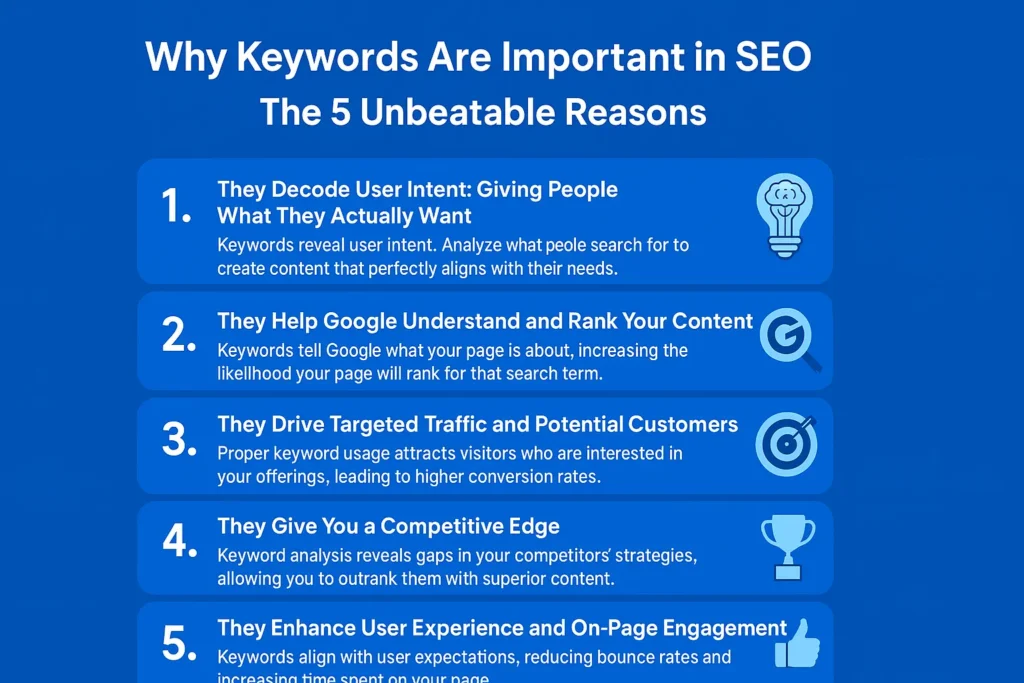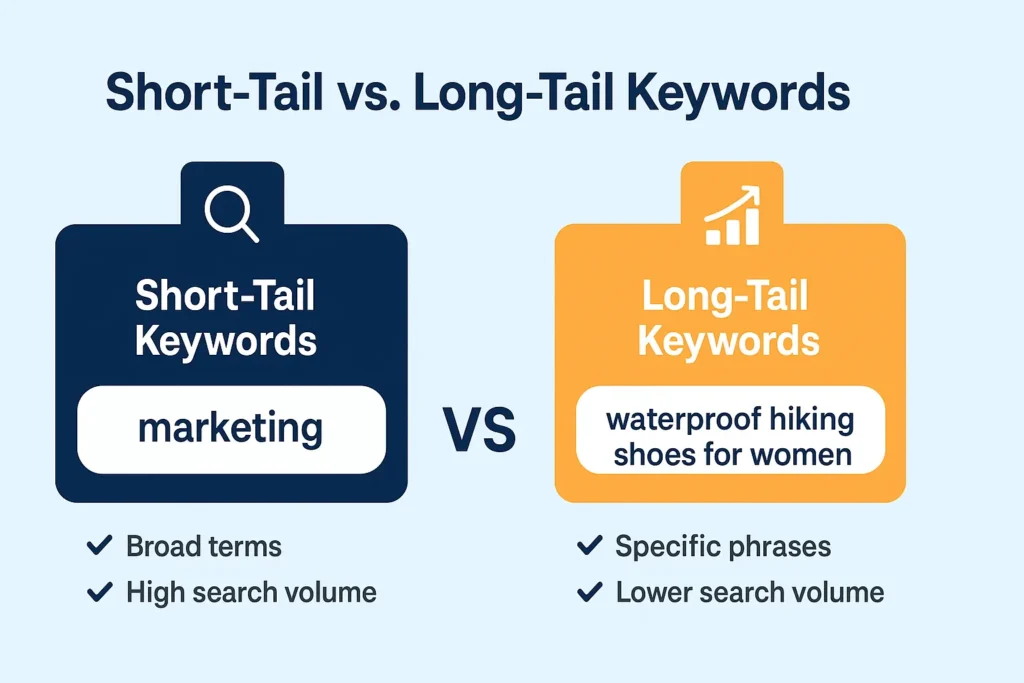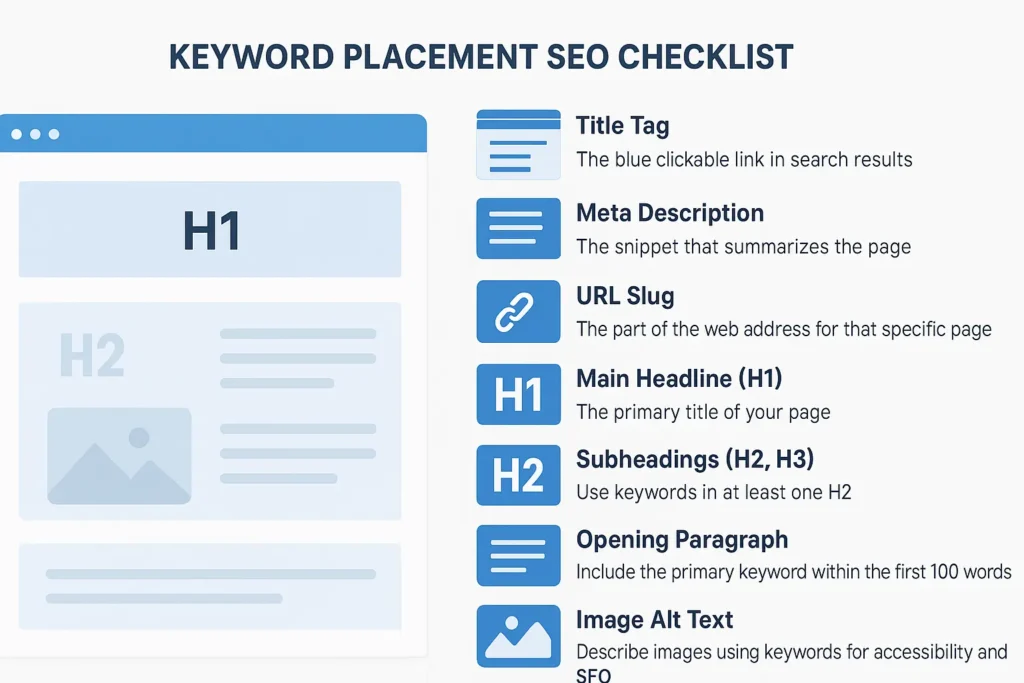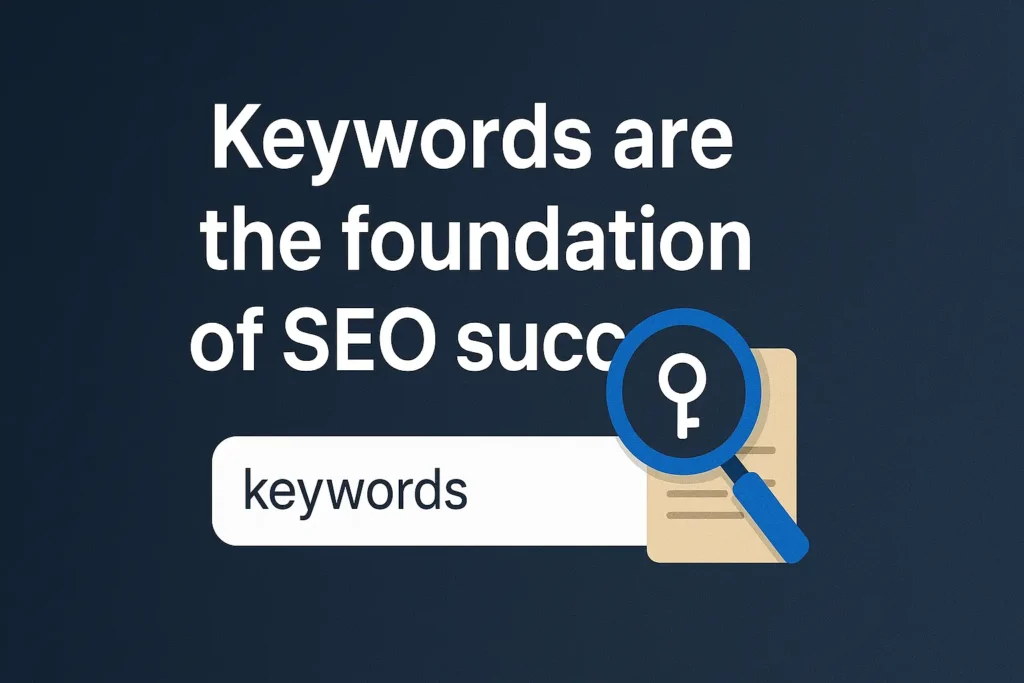Are Keywords Important for SEO? A Simple Yes, The 5 Unbeatable Reasons

Let’s cut through the noise. Are keywords important for SEO? The answer is a simple, powerful, and undeniable yes. In the vast universe of digital marketing, keywords are not just important; they are the fundamental building blocks. They are the bridge connecting a user’s question to your answer. Ignoring them is like opening a shop in a deserted alley with no sign—you have what people need, but they will never find you. This guide will explain exactly why keywords are the non-negotiable secret sauce of any successful online marketing effort.
Are Keywords important for SEO
At its heart, a keyword is a word or phrase that someone types into a search engine like Google. It’s a direct signal of their intent, their problem, or their desire.
- “digital marketing services”
- “best coffee shop near me”
- “how to write a cover letter”
These are all keywords. They are the clues your potential customers leave behind. Your job is to understand these clues and use the same language on your website. This is the core of a smart marketing strategy. Think of it like this: if you sell handmade leather bags at a market and someone is asking vendors, “Do you have a genuine leather crossbody bag?” but your sign just says “BAGS,” you might be overlooked. If your sign says “HANDMADE GENUINE LEATHER CROSSBODY BAGS,” you’ve just matched their exact keyword. They walk right over. The same principle applies online.
Why Are Keywords Important for SEO: The 5 Unbeatable Reasons

Understanding are keywords imortant for SEO is critical for anyone serious about their online presence. They are the linchpin that holds your entire strategy together. Here’s a breakdown of why they matter so much.
1. They Decode User Intent: Giving People What They Actually Want
The single most important job of keywords is to reveal user intent. What is the person behind the search really trying to accomplish? Keywords are a direct window into your audience’s mind. By analyzing which terms they use, you can create content that perfectly aligns with their needs. This moves you beyond guesswork into data-driven content creation. Whether they want to learn, find a local business, or buy a product, the keyword tells you everything. This understanding of intent is the first step in answering are keywords important for SEO effectively.
2. They Help Google Understand and Rank Your Content
Google’s mission is to deliver the most relevant and helpful results for every query. To do this, its bots must understand what your page is about. Keywords are the primary language you use to communicate with these bots. When you use a specific keyword phrase in your titles, headings, and content, you are essentially telling Google, “My page is about this topic!” This clear signal makes it exponentially more likely that Google will show your page for that search term. This technical function is a core part of why are keywords important for SEO.
3. They Drive Targeted Traffic and Potential Customers
Using the right keywords acts as a highly effective filter. It ensures that the people who find your website are already interested in what you offer. For instance, targeting “ppc advertising management for small business” will attract business owners actively seeking that service. This is qualified, targeted traffic. These visitors are far more likely to spend time on your site, sign up for your newsletter, or make a purchase because you are providing a direct solution to their problem. This is infinitely more valuable than attracting random, uninterested visitors and is a primary reason are keywords important for SEO success.
4. They Give You a Competitive Edge
A thorough keyword analysis allows you to identify gaps in your competitors’ strategies. You can see what terms they are ranking for and, more importantly, which ones they are missing. This intelligence allows you to create superior, more comprehensive content that targets those overlooked keywords. If your rival has a thin article on “email marketing best practices,” you can create a definitive guide, complete with case studies and templates, using the same core term. This strategic advantage shows why are keywords important for SEO for outpacing your competition.
5. They Enhance User Experience and On-Page Engagemen
Are keywords important in seo goes beyond just Google; it’s also about human connection. When a user clicks on your search result and immediately sees the same words they just typed, it creates a moment of validation. They feel they are in the right place. This positive user experience reduces bounce rates and increases the time they spend on your page—a key ranking factor. A seamless experience from search query to landing page builds trust and authority, whether the user is on a desktop or using mobile phones.
Short-Tail vs. Long-Tail Keywords: A Strategic Choice

Not all keywords are created equal. Understanding the difference is crucial for allocating your efforts effectively.
- Short-Tail Keywords: These are broad, generic terms usually one or two words long (e.g., “marketing,” “shoes,” “phones”). They have high search volume but are extremely competitive and often have vague intent. Ranking for them is a long, difficult battle.
- Long-Tail Keywords: These are longer, more specific phrases (e.g., “waterproof hiking shoes for women with wide feet,” “digital marketing mcqs with answers”). They have lower search volume individually but are far less competitive. Crucially, they reveal very clear user intent. Someone searching for a long-tail phrase knows exactly what they want and is much closer to making a decision, making them highly valuable.
Pro Tip: The foundation of a strong SEO strategy is built on long-tail keywords. They are easier to rank for and deliver more qualified traffic. It’s better to be the #1 answer for a specific question than to be on page 10 for a broad term.
How Important Are Keywords in SEO Without Being Spammy?
It’s not about keyword stuffing. Google’s algorithms are sophisticated and penalize awkward, unnatural text. The goal is strategic integration.
- Write for Humans First: Craft your content to be helpful and engaging for a real person.
- Natural Placement: Weave your primary and secondary keywords into the text organically. Read it aloud. If it sounds forced, rewrite it.
- Answer the Query Thoroughly: Focus on being the best answer. Comprehensive content will naturally include your keyword and related terms.
Where to Place Keywords for Maximum Impact: Your SEO Checklist

To make the most of your primary keyword “are keywords important for seo” and your secondary terms, place them strategically:
- Title Tag: The blue clickable link in search results. (Keep under 60 chars).
- Meta Description: The snippet that summarizes the page. (150-160 chars).
- URL Slug: The part of the web address for that specific page.
- Main Headline (H1): The primary title of your page.
- Subheadings (H2, H3): Use keywords in at least one H2.
- Opening Paragraph: Include the primary keyword within the first 100 words.
- Throughout the Body: Use the keyword naturally, aiming for ~1% density.
- Image Alt Text: Describe images using keywords for accessibility and SEO.
- Conclusion: Reinforce the topic by mentioning it at the end.
How to Find Powerful Keywords for Your Digital Marketing Campaign
You don’t always need expensive tools to start.
- Brainstorm: Think like your customer. What would you search for?
- Use Google Autocomplete: Start typing your main idea into Google and see what suggestions pop up.
- Analyze “People Also Ask” & “Related Searches”: These sections on the search engine results page (SERP) are goldmines for questions and related terms.
- Research Competitors: See what keywords are working for others in your space.
Putting It All Together: A Real-World Scenario
Imagine a local bakery, “Chicago Gluten-Free Delights.”
- Bad Keyword: “Cakes” (Too broad, high competition)
- Good Keyword: “Chicago birthday cakes” (Better, but still competitive)
- Great Keyword: “gluten free birthday cake delivery downtown chicago” (Specific, shows high intent)
They would create a page targeting that long-tail keyword. The title tag would be “Gluten Free Birthday Cake Delivery in Downtown Chicago.” The page would detail their options, ingredient sourcing, and delivery radius, using related terms like “dairy-free icing” and “nut-free facility.” They wouldn’t compete with global cake giants; they’d become the top result for their ideal, local customer. This is the power of keywords combined with location based services.
The Final Word: So, Are Keywords Important for SEO?

After examining the mechanics, the approach, and the clear logic behind everything, we return to the main question one last time: Are keywords important for SEO?
The answer is not just a simple yes—it is a strong confirmation that resonates through every update to search algorithms and every effective online strategy. To ignore the value of keywords is like trying to sail across the digital sea without a compass. They are much more than just words; they are the coded messages of human needs, the basic elements that connect a user’s problem with your solution. This guide has explained the main reasons are keywords important for SEO, showing that their role goes beyond just improving rankings to becoming the core of user-focused marketing.
The path of a keyword, from a thought in a user’s mind to a search query typed into a search bar and finally to a relevant result on your website, is the whole story of modern search.
This process clearly shows are keywords important for SEO—they are the essential link. Without this link, even the most creative, well-structured, and informative website can become a place that no one visits, a collection of answers to questions that no one is asking in a language that search engines cannot understand. When you use keywords strategically, you are not just “optimizing”; you are actively converting your expertise into the language of your target audience, making sure you show up exactly when you are most needed. This is the final answer to anyone wondering if are keywords important for SEO—they are the key difference between being forgotten and being relevant.
Thus, the ongoing discussion about are keywords important for SEO has largely been settled.
The question for today’s businesses is no longer whether they matter, but how to use them effectively with skill and care. The days of random keyword stuffing are gone, replaced by a focus on intent-based optimization. This means your attention should be on understanding the “why” behind the “what.” It’s about organizing content around topics, answering related questions, and fully meeting the user’s needs. This advanced approach is the real progress in understanding are keywords important for SEO. They are the starting point for creating comprehensive, authoritative, and genuinely helpful content—content that both Google and people appreciate.
In short, to create a lasting and visible online presence, you must accept that keywords are important for SEO as the unshakable foundation.
They are the base upon which everything else—technical performance, backlink profiles, and user engagement—is built. A weak foundation can bring the whole structure down. Ignoring keyword research is like building a stunning shop on an unknown, unmapped road. By adopting a strong keyword strategy, you effectively place signs, light the way, and welcome your ideal audience. You move from hoping to be found to making sure you are discovered. So, let the question of whether keywords are important for SEO disappear and replace it with action. Start with a single search query, understand what the user is looking for, and create something that truly adds value. That is how you turn the theoretical power of keywords into real results that bring traffic and grow your business.
. So, are keywords still important for SEO in 2025?
Absolutely, yes. While SEO has evolved far beyond just keywords, they remain the fundamental building blocks. Search engines still rely on keywords to understand your content’s topic and purpose. The key difference is that modern SEO focuses on user intent behind the keyword rather than just the keyword itself. Keywords are important for SEO as the primary signal of what a page is about.
I've heard about "keyword stuffing." What is it, and should I avoid it?
Keyword stuffing is the outdated, black-hat practice of cramming a keyword into content as many times as possible, often making the text sound unnatural and robotic (e.g., “Our SEO keywords are important for SEO services because keywords are important for SEO success.”). You must avoid this. Google’s algorithms heavily penalize this practice. Instead, focus on using keywords naturally and contextually where they make sense for the reader.
What's the main reason why keywords are important in SEO for user experience?
Keywords are important in SEO for UX because they create a seamless connection between the user’s search and your content. When a user clicks on your result and immediately sees the same phrases they searched for in your headings and content, it validates that they’ve found a relevant page. This reduces bounce rates and increases engagement, which are positive ranking signals for Google.
How many times should I use my main keyword on a page?
There’s no magic number. The best practice is to aim for a natural density of around 0.5% to 1.5%. However, obsessing over a exact percentage is the wrong approach. Instead, focus on strategic placement: ensure your keyword is in the title tag, meta description, H1 heading, at least one H2 subheading, the first paragraph, and sprinkled naturally throughout the body content. Write for clarity first, and the appropriate density will often follow.
What's more important: short-tail or long-tail keywords?
For most businesses, especially those just starting with SEO, long-tail keywords are important for SEO strategy. They are less competitive, easier to rank for, and attract highly targeted traffic with clear intent. While short-tail keywords have high volume, they are incredibly competitive and often have vague intent. A strong strategy targets a foundation of long-tail keywords to build authority before competing for broader terms.



